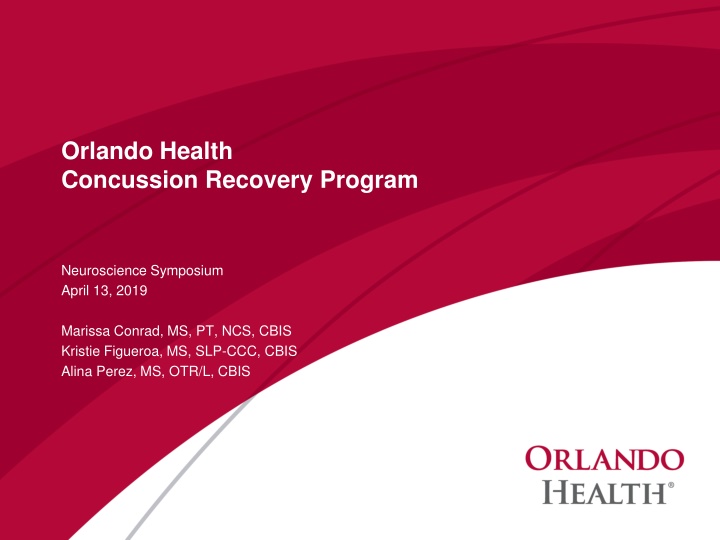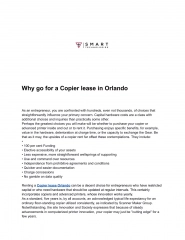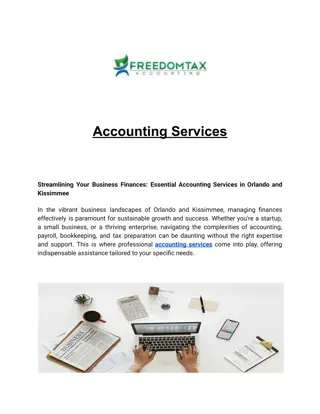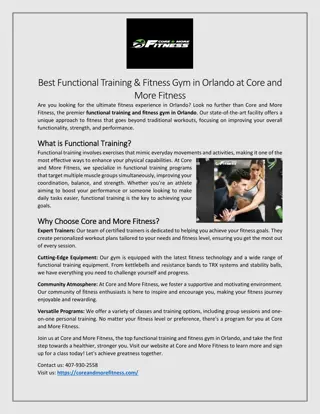Orlando Health
Orlando Health Concussion Recovery Program presented at the Neuroscience Symposium focusing on the interdisciplinary team approach, early intervention, concussion overview, recovery expectations, outpatient therapy, common symptoms observed, and new intervention guidelines.
Download Presentation

Please find below an Image/Link to download the presentation.
The content on the website is provided AS IS for your information and personal use only. It may not be sold, licensed, or shared on other websites without obtaining consent from the author.If you encounter any issues during the download, it is possible that the publisher has removed the file from their server.
You are allowed to download the files provided on this website for personal or commercial use, subject to the condition that they are used lawfully. All files are the property of their respective owners.
The content on the website is provided AS IS for your information and personal use only. It may not be sold, licensed, or shared on other websites without obtaining consent from the author.
E N D
Presentation Transcript
Orlando Health Concussion Recovery Program Neuroscience Symposium April 13, 2019 Marissa Conrad, MS, PT, NCS, CBIS Kristie Figueroa, MS, SLP-CCC, CBIS Alina Perez, MS, OTR/L, CBIS
1 Objectives Concussion Overview Interdisciplinary Team Approach Early Intervention Concussion Recovery Program
2 Concussion The Centers for Disease Control (CDC) estimates that 1.6 to 3.8 million people experience concussions during sports and recreational activities annually in the United States.
3 Concussion Overview A concussion is considered a mild traumatic brain injury. A concussion may be present even though all imaging is negative.
4 Recovery Expectations The majority of symptoms resolve within 2-3 weeks Small subset of patients experience symptoms after 3 months
5 Outpatient Concussion Therapy Team SLP/OT PT PT/OT MD PT Neuropsychology/MD
6 Common Symptoms Observed Attention/Memory Dizziness Motion Sensitivity VOR Impairments Visual processing Visual perception Convergence Insufficiency Oculomotor Impairments Headache Dizziness Pain Fatigue Emotional Overlay
7 Intervention New Guidelines Previous recommendations included: No activity with complete rest until asymptomatic New research demonstrates: Graded exercise assessments are safe and aerobic exercise improves symptoms (Sullivan, 2018) Early physical activity in the acute phase following a concussion may decrease the time needed for symptom resolution compared to immediate rest (Lempke, 2019) Moderate levels of cognitive and physical exertion over the first month post-injury had improved outcomes over small or large amounts (Sawyer, 2016)
8 Intervention Guidelines Even brief periods of restricted physical inactivity or bed rest have negative effects on cardiovascular musculoskeletal, metabolic, endocrine, hematologic and psychological functioning and can results in symptoms (light headedness, fatigue, dizziness, irritability etc) that are similar to those observed among patients with acute concussion (Ellis 2018) Patients with poor coping skills may demonstrate maladaptive behaviors that affect overall recovery. Education and reassurance are the most effective forms of early intervention and may help prevent anxiety, poor coping skills and limited recovery. Sandel, Reynolds, Cohen, Gillie, Kontos. Anxiety and Mood Clinical Profile Following Sports-Related Concussion : From Risk Factors to Treatment. Sports Exercise and Performance Psychology 2017 (Vol 6, No. 3, 304-323) DiFazio, M., Silverberg, N. D., Kirkwood, M. W., Bernier, R., & Iverson, G. L. (2016). Prolonged Activity Restriction After Concussion: Are We Worsening Outcomes? Clinical Pediatrics,55(5), 443-451.
9 2018 CDC Guidelines for Children Related evidence suggests that early rest (within the first 3 days of injury) may be beneficial, but that inactivity beyond this period for most children may worsen their self reported symptoms. Following these first several days, health care professionals should counsel patients and families to resume a gradual schedule of activity that does not exacerbate symptoms, with close monitoring of symptom expression. Because post-concussive symptoms resolve at different rates in different children after mTBI, individualization of return-to-school programming is necessary. Lumba-Brown, A, et al. Centers for Disease Control and Prevention Guideline on the Diagnosis and Management of Mild Traumatic Brain Injury Among Children. JAMA Pediatrics 2018 (Vol 172, No. 11, 1-13)
10 Early Intervention Education / Reassurance: Explanation of injury Expected signs/symptoms Expectation for recovery Strategy education to reduce symptoms Behavioral regulation plan Sleep schedule Adequate nutrition/hydration Daily movement Stress management Utilize positive framework to minimize nocebo effect Sandel, Reynolds, Cohen, Gillie, Kontos. Anxiety and Mood Clinical Profile Following Sports-Related Concussion : From Risk Factors to Treatment. Sports Exercise and Performance Psychology 2017 (Vol 6, No. 3, 304-323)
11 Early Intervention Return to Learn / Work Avoid comprehensive cognitive assessments early on to prevent nocebo effect Return to Learn: starts 2-5 days post injury; includes stepwise protocol to ensure gradual return to learning activities to avoid exacerbation of symptoms Return to Work: assistance with returning to work duties and providing recommendations as needed Willer, Barry, Leddy, John. Management of Concussion and Post-Concussion Syndrome. Current Treatment Options in Neurology. 2006 (8;415-426)
12 Outpatient Evaluation Physical Therapy Cerebellar Dysdiadochokinesia, finger to nose Oculomotor VOMS Smooth Pursuits, Saccades, Convergence Vestibular 74% of concussion patients with post traumatic dizziness were found to have positive vestibular abnormalities findings Dynamic Visual Acuity assessment BPPV screen Musculoskeletal Cervical spine assessment Balance Tests Sensory Organization Test Gait Assessment Exertion Testing with HR monitoring Self Assessment
13 Treatment Physical Therapy Oculomotor treatment Vestibular therapy Typically rapid head or body movements exacerbate symptoms, difficulty seeing while head is moving, dizziness, fogginess, nausea and a feeling of being detached, anxiety and overstimulation in more complex environments Exertion Training Cervical Spine treatment Return to Play Protocol: initiated for athletes Medical clearance is necessary for ALL athletes prior to return to play to reduce risk of Second Impact Syndrome Gurley JM, Hujsak BD, Kelly JL. Vestibular rehabilitation following mild traumatic brain injury. NeuroRehabilitation 2013;32(3):519-28.
14 Treatment Cognition at 12 weeks Most cognitive symptoms will resolve early on but 5-15% of patients continue to experience cognitive symptoms after 90 days. If symptoms persist at week 12, then patient demonstrates residual cognitive deficits and traditional cognitive therapy is recommended. Sohlberg, M. M., & Ledbetter, A. K. (2016). Management of Persistent Cognitive Symptoms After Sport Related Concussion. American Journal of Speech Language Pathology,25, 138-149.
15 Contact us: Orlando Health Outpatient Rehab 100 W. Gore Street Suite 104 Orlando, FL 32806 Phone: (407) 841-8911 Fax: (407) 843-6762 Marissa.Conrad@orlandohealth.com Kristie.Figueroa@orlandohealth.com Alina.Perez@orlandohealth.com























